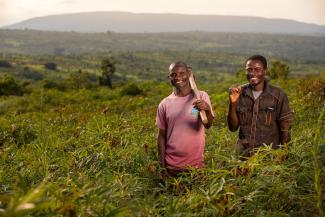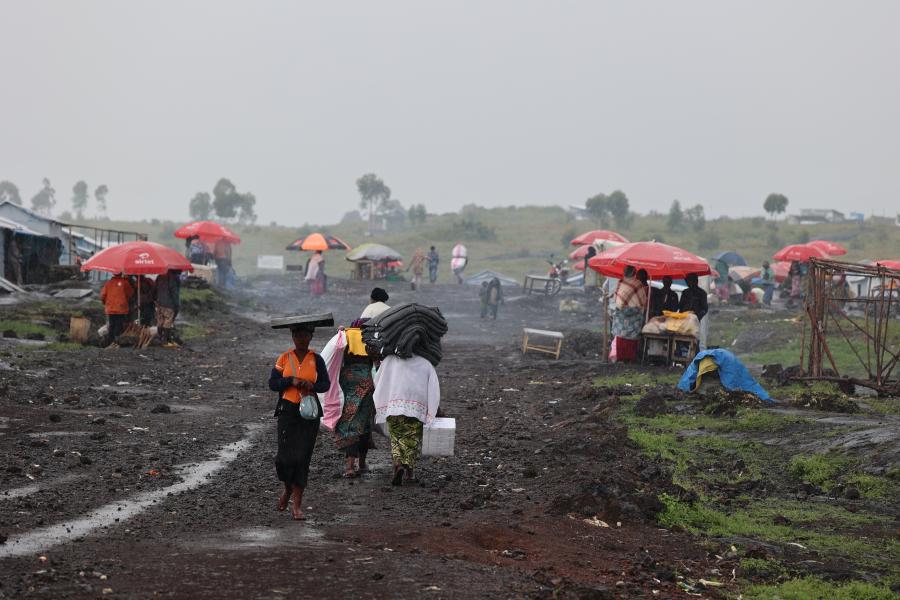Population figures | 2021 - 2025
2025 situation overview
The emergency in the Democratic Republic of the Congo (DRC) continues to represent one of the most protracted and complex humanitarian crises in the world. Decades of clashes between the Congolese armed forces and various non-State armed groups, widespread violations of human rights, and devastating incidents of gender-based violence have caused unprecedented levels of humanitarian needs, increased vulnerabilities and protection risks.
The escalation of violence in eastern DRC since January 2025, including the targeting of displacement sites and destruction of key infrastructure such as schools and health centres, has increased the number of people displaced within the country to an all-time high of 7.3 million and forced more than 86,000 to flee to neighbouring countries. In Burundi, which has received the majority of new arrivals from the DRC, the influx of refugees has led to overcrowding, putting immense pressure on already limited resources and access to essential services.
In addition, more than 1 million people remain displaced beyond the country’s borders, forced to seek asylum primarily in Angola, Burundi, the Republic of the Congo, Malawi, Rwanda, South Africa, Uganda, the United Republic of Tanzania, and Zambia – countries that, despite facing deepening socioeconomic and development challenges, have maintained an open-door policy for people forced to flee. At the same time, the DRC hosts more than half a million refugees and asylum-seekers from neighbouring countries. Prior to the escalation of conflict in 2025 , a resurgence of fighting caused mass casualties and the displacement of over 738,000 people between January and March 2024. Security conditions quickly deteriorated in the eastern provinces of the DRC, with North Kivu, South Kivu and Ituri being the most affected. Violent clashes between armed groups in North Kivu and South Kivu forced people to flee their homes, including from and to areas where humanitarian access is limited. Incursions by non-state armed groups into IDP sites were also recorded, causing severe protection incidents. In Ituri, intercommunal clashes were responsible for dozens of deaths and human rights violations. In the first half of 2024 alone, more than 940,000 people were forced to flee violence.
In April 2024 the Principals of the Inter-Agency Standing Committee – 20 representatives of NGOs and UN agencies – issued an urgent warning that the conflict was leading to record levels of sexual violence, forced displacement, and hunger. The UN Stabilization Mission in the DRC (MONUSCO) concluded its operations in South Kivu in April, completing the transfer of responsibilities to the Government by the end of June. The commitment to collectively work towards a progressive, responsible transition out of the remaining provinces of North Kivu and Ituri has not (as of October 2024) translated into setting a specific timeline for withdrawal by MONUSCO.
Forced displacement in the most affected provinces in DRC is expected to continue in 2025, worsening the already dire humanitarian emergency in the country, with 27 million people in need of support as a result of conflict, food insecurity, climate impacts and epidemics in 2024.
In 2025, within the DRC, community-based protection and protection monitoring, analysis and reporting, health, education and livelihoods will remain key priority response areas. Over 273,000 children and caregivers will receive child protection services, while more than 170,000 refugees and IDPs will benefit from specialized gender-based violence programmes to enable them to live in peace and security.
To enable refugees to live dignified lives, the enrolment of some 50,000 children in primary and secondary education will be supported and more than 90,000 consultations will be provided at UNHCR-supported health care services.
To increase levels of self-reliance, some 27,000 refugees and returnees will benefit from livelihoods and economic inclusion interventions.
UNHCR will continue to play a leadership and advocacy role in the Protection Cluster, the Shelter and Non-Food Items Cluster and the Camp Coordination and Camp Management Cluster. In particular, the strengthening of protection interventions, including gender-based violence prevention and response, risk mitigation and response mechanisms, implementation of climate action initiatives and strengthening of communities' resilience to climate hazards while expanding access to durable solutions will be prioritized.
In neighbouring countries, UNHCR and partners will engage with governments to ensure that people forced to flee can reach safety and have their claim for asylum heard fairly and efficiently. UNHCR will continue advocating for refugees’ rights including education and health care, while promoting access to national social protection programmes for refugees in protracted situations or with high protection needs.
UNHCR will continue to lead the Regional Refugee Response Plan (RRP), an inter-agency planning, coordination, and fundraising tool developed through collaboration with the Governments of Angola, Burundi, the Republic of Congo, Rwanda, Tanzania and Uganda and over 100 humanitarian partners to provide protection, assistance, and durable solutions to refugees from the DRC and their host communities, as well as to support resilience. As set out in the RRP, and in accordance with the Global Compact on Refugees and the Refugee Coordination Model, host governments will steer the response, while RRP partners, led by UNHCR, will support and complement national and regional strategies, working closely with donors, development actors, the private sector, and civil society.
A focus on solutions will continue by promoting resettlement opportunities and complementary pathways for refugees and supporting the voluntary repatriation of families in Angola, Malawi, Mozambique, Namibia, South Africa and Zambia, where conditions in their home areas in the DRC allow for a safe and dignified return. In 2025, UNHCR will provide reintegration support to more than 16,000 refugees repatriated to DRC.
Financial overview
A close friendship builds peace between communities in DR Congo
By Aline Irakarama in Kalemie, Democratic Republic of the Congo
Hoes on their shoulders, Kalonda and Samueli laugh and chat as they stroll home after a hard morning working the fields outside their village of Sango Malumbi, in the south eastern province of Tanganyika. After conflict erupted between neighbouring communities in south-eastern Democratic Republic of the Congo, a long-standing friendship between two men helped bridge the divide.
Read the story










